- Home
- Alan Bennett
Allelujah! Page 7
Allelujah! Read online
Page 7
Ambrose The truth is I’m expecting a visit from one of my old pupils. He’s just got back from …
Gilchrist You don’t want your bag emptying?
Ambrose Addis Ababa.
Pinkney (starts to wheel him into position) Where did you say?
Ambrose Addis Ababa.
Pinkney Oh, he won’t be coming now.
Ambrose Why? We don’t know.
Pinkney Yes, we do. There’s been a bus strike.
Salter Friends. Because we’re all friends here. Some of you old friends.
There is banging on the tray from Molly.
Thank you. (Meaning it to stop here, which it doesn’t.)
Gilchrist That’s enough, Molly.
Molly promptly stops.
Salter And if you’re seeing this courtesy of Pennine People, then you’re likely to be a friend, too. One of the many thousands loyal to our much-loved hospital, and who have given us your support. We can all be truly proud of ourselves. I’m afraid, though, that there’s no decision yet, so there’s still the threat of Tadcaster.
Hazel Where’s Tadcaster?
Salter It’s not where it is. It’s what it is. Big, modern and with a huge catchment area, some people say Tadcaster is the future and that we belong to yesterday already. Well, here at the Beth, cosy, friendly and above all local, we believe that yesterday is the new tomorrow.
Finally, an unexpected pleasure and a great honour for our hospital. Our longest-serving nurse is due to retire in a few weeks’ time and, in recognition of her service, the Royal College has awarded her its Bywater Medal, which I am now delighted to present. Sister Gilchrist, our own Lady with the Lamp.
Gilchrist steps up and he pins on the medal.
Some applause, though one call of ‘stab her’ as he pins it on.
Molly bangs her tray.
Salter That’ll do, Mrs Ridsdale.
She continues to bang.
Gilchrist Molly. Knock it off.
She promptly stops.
Salter Sister Gilchrist.
Gilchrist I won’t keep you long. Mrs Mathieson wants changing and we’re waiting to do the drug round; Miss Proctor’s cannula is leaking through its bandage; and I’ve all the paperwork to do with Mr Colman’s unexpected departure this morning. You’ll forgive me if I don’t gloss over these mundane and possibly distasteful concerns, but they are the small change of a nurse’s day. I have switched off my pager, or it would doubtless be reminding me that it’s time for Mr Satterthwaite to take his prostate pill, and Mrs Hainsworth her Losec.
Nursing is thought to be a calling. To be a nurse one is expected to have a vocation. My vocation came about like this.
My mother was a widow. I was an only child. When I was thirteen, no older, my mother took to loaning me out, hiring me to be more exact, to anyone who needed help with a senile parent. Typically, it would be someone who said, ‘We have to do everything for them.’ When anyone says that, as I soon learned, it means they have to do one thing for them … clean them up, and this I did. Joyless though my life was, I was still doing it six years later when my mother went the same way and so became what one might call my client, and I her somewhat uncaring carer. Then she died, and I had to find a job.
It was only then that I realised that what I had regarded at best as distasteful and at worst as slavery was in fact my apprenticeship. And so I became a nurse. It was not easy. Nobody had told me that nursing meant passing examinations. Thanks to my mother I had missed much of my schooling so I wasn’t much good at that. But I managed the basics, and via a care home graduated to geriatrics, where the finer skills are seldom required. I don’t know who the other recipients of the Bywater Medal are, but I imagine they will have credits and diplomas galore. Not me. Because nursing is not my chosen vocation but just where I’ve landed up though it doesn’t make me any less of a nurse … as this medal seems to acknowledge …
Salter thinks she has finished and gets up.
Salter Thank you … sorry!
Gilchrist … It has not been easy but all I can say is that I have done what I could.
I shall wear my medal with pride, but it will be a reminder of what nursing used to be like. If I am an award-winner, it is because I am old-fashioned. I have comforted the afflicted. I have treated the sick and I have consoled the dying. Nursing, I have made room.
Salter Thank you, Sister Gilchrist. Outspoken as ever.
The choir sings again.
MUSIC: ‘Congratulations’ (Cliff Richard).
As they perform, Alex and Cliff are with Salter. They have a laptop. As Salter watches it, cross-fade to:
The camera crew, once more in evidence, this time focusing on Gilchrist. A voice interviewing her, but no light on the interviewer.
Gilchrist Not at all. I was actually looking forward to retirement and hanging up my Marigolds.
When I first started nursing, there was much talk of targets. Targets was the new and exciting idea that was going to galvanise the Health Service. Put in charge of old people, I found it hard to see what targets there could be. And nobody told me.
On any other ward, the target was recovery and discharge. But here if there was recovery there was often no discharge. So there was just one target and that was death.
Voice And you helped them achieve that?
Gilchrist A more rapid turnover on the ward seemed to suit everybody. And I mean everybody.
The doctors, for obvious reasons, the loved ones, socalled, who seldom visited, and when mother or father died, the relatives seemed glad to be relieved of the obligation.
Voice You say everybody seemed pleased. Does that include the patients?
Gilchrist I was a facilitator, self-appointed, I agree, and in any other profession – and nursing is a profession if it is allowed to be – in any other profession, I would be called a progress-chaser.
Voice Did nobody ask?
Gilchrist I am not a doctor. I am a woman. I’m a nurse. Nobody was interested.
Voice Was it just random?
Gilchrist Certainly not, I’m a professional. I didn’t just pick on anybody. There had to be a criterion. What makes most work on wards like these is incontinence. I had a list, and as soon as anybody started to soil themselves, they went on it.
Voice Was that where you drew the line? Nobody ever asked?
Gilchrist Not until Mrs Maudsley.
Voice You were fond of Mr Colman?
Gilchrist Well, normally he was clean. I kept a record. I have a notebook somewhere.
Voice Yes. We have it.
Gilchrist I felt I was making a contribution.
Voice By killing old people?
Gilchrist By helping them to die. Clearing the decks.
Voice It’s no less murder for being a metaphor.
You say life was a burden to them. Do you think this is what they would have chosen?
Gilchrist How should they choose between life and death? Most of them can’t even choose between mince and macaroni.
Voice We’ll take a break there. Interview suspended at 15.35 p.m.
It’s only fair to say that you’re looking at a very long sentence: life, and with no one to commute it as you so kindly did theirs.
Another interview comes into focus on the other side of the stage: Valentine’s hearing.
Voice You’re in the news. This nurse. Did you know her?
Valentine Of course.
Voice And you never twigged?
Valentine It’s hardly what one expects.
Voice You don’t have a suspicious mind. Whereas I do. It’s what I’m paid for.
I see you had a student visa but stayed on. Well, at least you didn’t come in with a truckload of oranges.
So, what makes you think you would be an asset to this country?
Valentine I am a doctor.
Voice Besides that. We have doctors of our own. You must remember that in England there’s not an infinite amount of room. On a Saturday afternoon you can’t move, even in Pontefract.
Anything else?
Valentine I work with old people.
Voice It’s true there’s no shortage of those. Mostly white, I take it?
Valentine Why do you say that?
Voice The point I’m making is that being less advanced than we are, you tend to keep your own old people at home. Now, the questions.
I won’t insult you by asking who won the 1966 World Cup, but I see that the hospital where you work has a choir.
Valentine It has.
Voice Are you in the choir?
Valentine I sometimes help out.
Voice Well then, you won’t mind, just as a formality, if we ask you to sing something. ‘Land of Hope and Glory’. Do you want the words?
Valentine No.
Voice That’s good.
Valentine (sings)
Land of Hope and Glory,
Mother of the Free,
How shall we extol thee,
Who were born …
He stops.
Actually, I can’t.
Voice Oh, I was rather enjoying it.
Valentine I’ve never liked it. Even Elgar hated it.
Voice What’s he got to do with it?
Valentine He wrote the music.
Voice But it’s not the music you’re objecting to, is it? A pity. You were doing so well.
Valentine I’m auditioning to be English. What you’re wanting is a Brit.
Voice Good morning, Dr Valentine. Nice try.
Pause.
Oh, and when the time comes, I’d have my bags packed. They tend to call early in the day.
Colin and Salter watching the titles sequence of the documentary.
On the monitor: the opening ninety- second title sequence of their now complete documentary – WHEN CARERS KILL: DEATH AT THE BETH, a prime-time special. Cut fast, to music with commentary or captions putting together the highlights of the story:
Salter saying nobody likes old people.
Valentine holding Lucille’s hand.
Gilchrist in full kit.
Choir singing, plus the Pudsey Nightingale.
Death of Mrs Maudlsey.
Award of the Bywater Medal.
Salter reading a statement outside the hospital.
Gilchrist escorted to a prison van with screaming crowd.
Salter You ask me if I knew. I reproach myself now, but to be honest, I knew and I didn’t know, which is often the case when circumstances not of one’s choosing contrive to work to one’s advantage.
Colin I have mixed feelings. I grieve for my father, naturally. But I’m not sorry about the closure, though it was none of my doing. And there is a lesson here. It is that one person with conviction and a degree of self-regard can even by accident defeat the entirely worthy efforts of all the rest. Forget the beds trundled up Penyghent, the urologists abseiling down Gaping Ghyll and the midwives plunging across Morecambe Bay, all go for nothing when one person with an agenda of their own wills it otherwise. Democracy nothing. Will, that is what matters. What carries the day is will.
Salter Yours or hers?
Colin Will and chance. Never mind how many patients she saw off, she certainly killed the hospital.
The patients file on (in their outdoor clothes?) ready to go to Tadcaster, now accompanied by Pinkney, Gerald, Fletcher and Ramesh.
Lucille You’ve got yourself dolled up.
Mavis Well, we’re off to Tadcaster.
Hazel (pushing Ambrose’s wheelchair) We’re looking forward to it, aren’t we, Gilbert?
Ambrose ‘We’, Hazel? ‘We’? You and I do not belong together even in the same personal pronoun.
Hazel Well we might at Tadcaster.
Pinkney You won’t know you’re born. There’ll be WiFi, and you’ll be able to Skype your loved ones on a daily basis. Skype! Skype!
Neville The other one was a villain. Now this one’s taken leave of her senses.
Pinkney Trust me. Tadcaster will be heaven. (To Ramesh and Fletcher.) Are you coming?
Ramesh No.
Fletcher No fear. There’s a posh clinic just starting.
Pinkney Where?
Ramesh The in-place.
Pinkney Dubai?
Fletcher Hull!
Mary Tadcaster’s a bit far for folks to come, visitors.
Cora Well they never do come.
Mary Yes, only now they’ll have an excuse.
Ambrose Are you not coming?
Valentine To Tadcaster? I’m not asked. Having presented my furtive self for examination and been found wanting, I shan’t be available. Besides, I’ve been told I’m too hands-on.
He takes Ambrose’s hand.
Ambrose I shall miss you. You’ve saved my life.
Valentine No.
Ambrose No. You’re right. Nobody saves anyone’s life. Just postpones their death.
Valentine That’s the spirit.
Valentine pats him reassuringly.
Valentine He’ll come.
Ambrose Oh yes. In some shape or form.
Valentine turns front.
Valentine Nurse Pinkney was right when she said Tadcaster was going to be heaven. Only she never got to be an angel there, a casualty of the downsizing that privatisation inevitably involves.
Still, with the nurses largely from the Philippines, where they are brought up to treat the old with more respect, there were no complaints from the patients.
Who now go off, singing.
MUSIC: ‘Side by Side’ (Dean Martin).
Salter and Colin in separate spots.
Salter Though I managed to snap up the hospital buildings for one of my property companies, I was hoping for some appropriate recognition of my services in the form of a knighthood. Thanks to Sister Gilchrist, all I’ve ended up with is a measly CBE. However, after some well-placed philanthropy, at our local university I managed my heart’s desire in the form of an honorary degree. So now I am at last Doctor Salter.
And perhaps we see him in his academic robes.
Colin Salter notwithstanding, the sale represents a healthy capital gain for NHS funding, the hospital having reinvented itself as a boutique hotel, with, in a graceful acknowledgement of its previous existence, the principal suites named after Florence Nightingale and Edith Cavell. For the moment, its best-known nurse remains uncommemorated, though a play about her is threatened at the local theatre.
Valentine I see Alma, as I’m now permitted to call her, from time to time. It’s a place in the wilds of Lincolnshire.
In the prison garden.
Gilchrist I’m not unhappy.
I share a garden which I’ve never had. I prefer plants that grow in the shade. And I paint. All that. I’m still a celebrity only it’s wearing off. I don’t imagine I will ever be released. Though in case it would help I was advised to say sorry. Show some remorse.
Valentine And did you?
Gilchrist I did … but no one believes me.
And they’re quite right … I took … a short cut … several … I can see that. But if people love their parents why do they put them away?
Valentine Are you asking me?
Gilchrist No. That’s what I asked them. They said it wasn’t remorse.
Only it’s honest.
She takes his hand.
Will you come again?
Valentine How can I? I am forbidden these shores.
Gilchrist Will you write?
Valentine (turning out front) It was a difficult conversation and in one of the many pauses, for want of anything better, I said –
(Turning back to her) When I was doing my training, before I plumped for geriatrics, I was very keen on surgery. Through observing and even participating in colorectal surgery, I was struck by something extraordinary, namely that the flesh of the bowel of mature and even aged patients was no different from that of the flesh of a child or a young person. Unique among every department of the body, the bowel does not seem to age. So these ancient and faltering persons, carry within their venerable bodies a r
emnant of their infant selves, part of them still young and ageless.
Why? Solve that and you would undoubtedly get the Nobel Prize.
So you see, Alma, nobody can be quite written off, even the Pudsey Nightingale.
Gilchrist Perhaps.
She continues to garden. Valentine turns front again.
Valentine Well, at least she has her place, even if that place is prison. Me, I have no place.
Come unto these yellow sands and there take hands. Only not mine, and so, unwelcome on these grudging shores, I must leave the burden of being English to others and become what I have always felt, a displaced person.
Why, I ask myself, should I still want to join? What is there for me here, where education is a privilege and nationality a boast? Starving the sick and neglecting the old, what makes you special still? There is nobody to touch you, but who wants to any more? Open your arms before it’s too late.
In the meantime, though I cannot be English, I remain a doctor, if only in places where nobody asks questions … a doctor on a cruise ship for instance where, who knows, I might even meet somebody and have a shipboard romance.
So when you next go on a cruise to the Adriatic or the Greek Islands and get that nasty tummy bug, take another look at the ship’s doctor.
It might be me.
He smiles.
About the Author
Alan Bennett has been one of our leading dramatists since the success of Beyond the Fringe in the 1960s. His television series Talking Heads has become a modern-day classic, as have many of his works for stage including Forty Years On, The Lady in the Van, A Question of Attribution, The Madness of George III (together with the Oscar-nominated screenplay The Madness of King George) and an adaptation of Kenneth Grahame’s The Wind in the Willows. At the National Theatre, London, The History Boys won numerous awards including Evening Standard and Critics’ Circle awards for Best Play, an Olivier for Best New Play and the South Bank Award. On Broadway, The History Boys won five New York Drama Desk Awards, four Outer Critics’ Circle Awards, a New York Drama Critics’ Award, a New York Drama League Award and six Tonys. The Habit of Art opened at the National in 2009 and People in 2012, together with two short plays, Hymn and Cocktail Sticks.

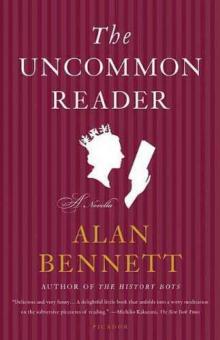 The Uncommon Reader: A Novella
The Uncommon Reader: A Novella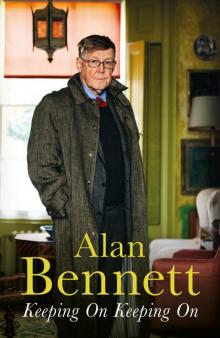 Keeping On Keeping On
Keeping On Keeping On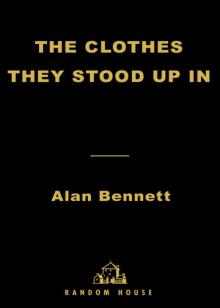 The Clothes They Stood Up In
The Clothes They Stood Up In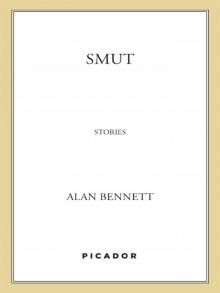 Smut: Stories
Smut: Stories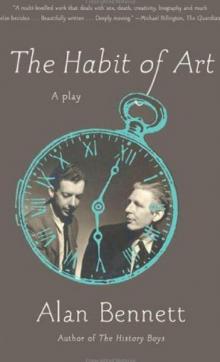 The Habit of Art: A Play
The Habit of Art: A Play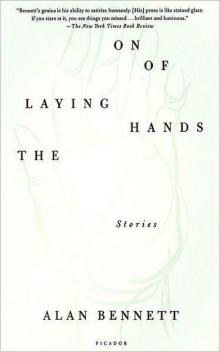 The Laying on of Hands: Stories
The Laying on of Hands: Stories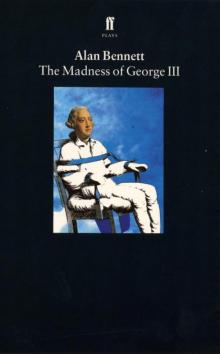 The Madness of George III
The Madness of George III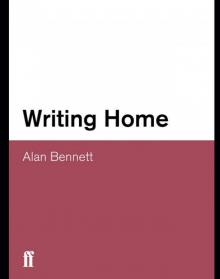 Writing Home
Writing Home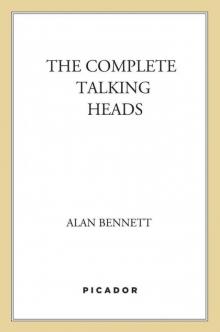 The Complete Talking Heads
The Complete Talking Heads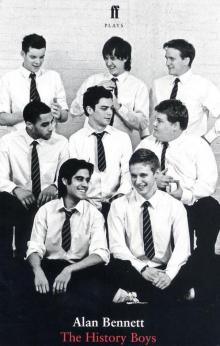 The History Boys
The History Boys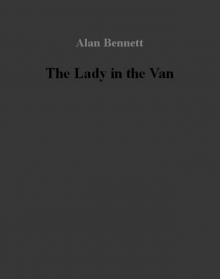 Lady in the Van
Lady in the Van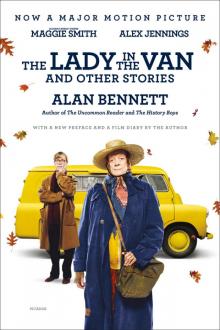 The Lady in the Van
The Lady in the Van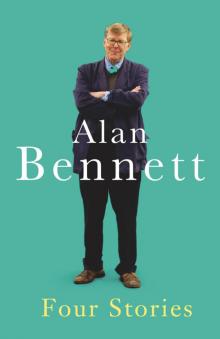 Four Stories
Four Stories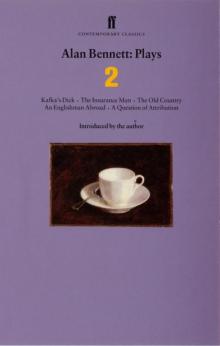 Alan Bennett: Plays, Volume 2
Alan Bennett: Plays, Volume 2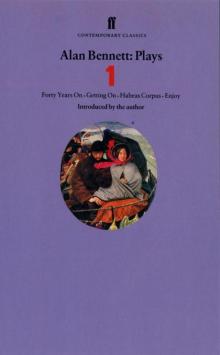 Alan Bennett: Plays, Volume 1
Alan Bennett: Plays, Volume 1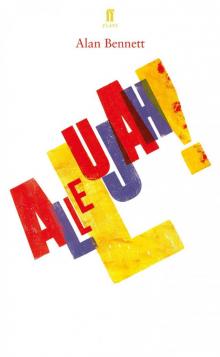 Allelujah!
Allelujah!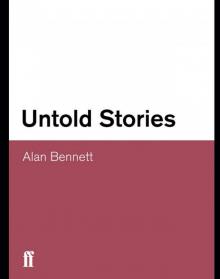 Untold Stories
Untold Stories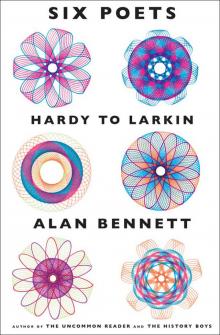 Six Poets
Six Poets